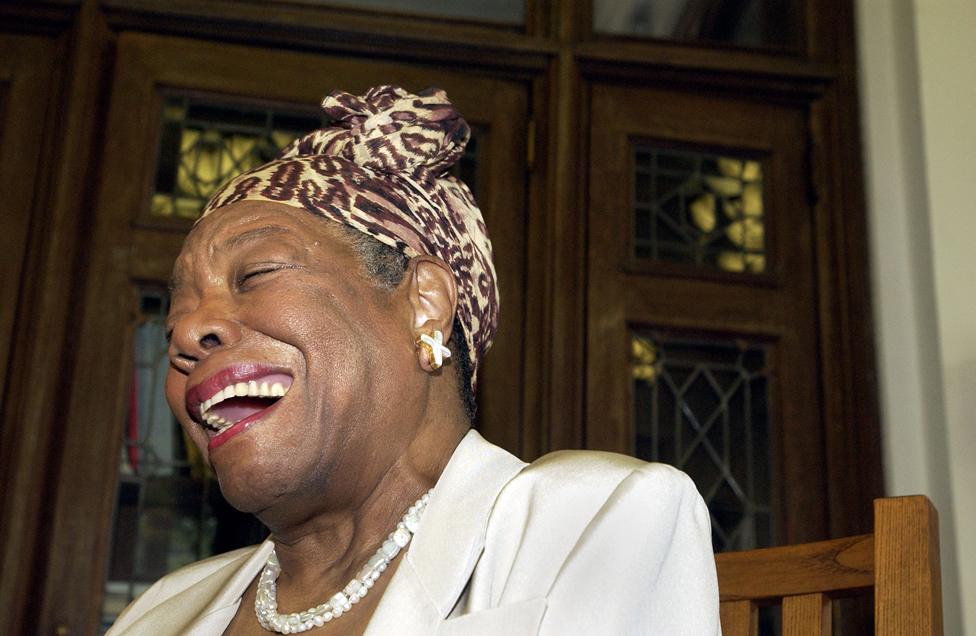Why feeling like a fraud can be a good thing
- Published

If you feel inadequate or that you are likely to be "found out" at work, you're probably not alone. It's part of a phenomenon called the "impostor syndrome" and it's very common, writes journalist Oliver Burkeman.
"I have written 11 books but each time I think 'Uh-oh, they're going to find out now,'" the novelist Maya Angelou once said.
"I've run a game on everybody, and they're going to find me out."
Angelou was nominated for the Pulitzer Prize, and won five Grammys for her spoken recordings, plus a myriad other awards.
But the "impostor phenomenon" - sometimes known as impostor syndrome - had her firmly in its grip. Public acclaim didn't dent the feeling that, deep down, she was a fraud, who didn't have a clue what she was doing.
You've probably felt the same. Most of us have. Yet a crucial element of the impostor phenomenon is the sense that you're the only person to suffer.
So you may not find it reassuring to learn that Angelou felt it too.
"Sure," you tell yourself, "she thought she was a fraud - but I really am one. And any day now, I'll be rumbled."

Angelou's first autobiographical book I Know Why the Caged Bird Sings was published in 1970
But the truth is you're far from the only sufferer. I have discovered the impostor phenomenon lurking in the minds of authors, artists, musicians, businesspeople - even a brain surgeon.
"Part of you knows you're not as good as you're pretending to be," says Henry Marsh, a neurosurgeon and author of the memoir Do No Harm.
"But you have to come across as being relatively competent and confident."
Author Frances Hardinge won the 2015 Costa Book of the Year Award for her novel The Lie Tree - but still, she says, with every new project, there's a "part of my brain that tells me that this is the book… where I disappoint everybody, and people see me for the fraud I am."
The underlying fear, says artist and musician Amanda Palmer, "is that someone's going to come knocking at the door.
"I call these fictional people the Fraud Police, and they're just going to tell you: 'We figured it out, and we're taking it all away.'"

Frances Hardinge reacts with surprise at the Costa Book Awards
It's long been noted that women seem to experience impostorism more frequently and acutely than men, probably because of pre-existing sexist stereotypes that call their professional competence into question.
Also, according to impostorism expert Dr Valerie Young, women are more likely to explain setbacks and failures as resulting from their lack of ability, while men are more prone to blame outside factors.
But nobody is immune - and though the phenomenon was first identified in the 1970s, psychologists say it seems to be ever more relevant in today's hyper-competitive, economically insecure world.
"Despite often overwhelming evidence of their abilities, impostors dismiss them as merely a matter of luck, timing, outside help, charm - even computer error," Young writes in The Secret Thoughts of Successful Women.

Find out more
The Impostors' Survival Guide is presented by Oliver Burkeman and produced by Peter McManus. You can listen on BBC Radio 4 at 11:00 on Tuesday 26 April, and at 21:00 on Monday 2 May or catch up afterwards on iPlayer.
iWonder: How do I stop feeling like a fraud?

"They feel that they've somehow managed to slip through the system undetected [so] in their mind it's just a matter of time before they're found out."
Perhaps the most frustrating irony is that getting better at your job won't make the phenomenon go away.
The more knowledge you acquire, the higher corporate levels you reach, the more likely you are to find yourself in new terrain - and therefore feeling like you're winging it.
The ultimate explanation for the impostor phenomenon lies in a fundamental fact about the human mind: we only know what's going on inside our own heads.
We hear our own constant monologue of self-doubt, but never anyone else's - making it all too easy to assume that nobody else has one.
As the saying goes, we "compare our insides with other people's outsides", and judge ourselves lacking as a consequence.
It's a problem rendered more acute by social media, which encourages us to present to the world a "highlights reel" of our lives, rather than the messy psychological reality.

Neurosurgeon Henry Marsh wrote an honest account of his career as a brain surgeon
Yet if it's terrifying to feel like the only fraud in your field or organisation, it's equally terrifying to confront the truth that everyone is winging it.
That's another reason why it can be hard to accept that the impostor phenomenon is universal: we desperately want to believe that there are grown-ups in control - especially in fields such as government, medicine or law.
Indeed, it has been argued that this is one reason people believe in otherwise ridiculous conspiracy theories.
In some sense, it's actually more reassuring to believe that a sinister cabal is manipulating the course of history than that they aren't: that way, at least someone would be indisputably in charge.
Is there any hope of escaping these ever-present feelings of fraudulence?
Talking openly about the problem is a start, says Valerie Young; senior employees can help by being honest with more junior ones.
But it's also a matter of "changing your thoughts, slowly over time", and taking risks in spite of the inner voice telling you you'll fail.
"Do the thing that scares the heck out of you, realise you survived - or maybe you fell flat on your face. But you gave it your best shot."
You don't need to try to eradicate the impostor feelings - but you also don't need to obey them, either.
"I'm pretty proud of myself for having been able to befriend my own Fraud Police," says Amanda Palmer. She accepts that they exist, but she doesn't let them run her life.
Ultimately, you should probably worry more if someone tells you they've never felt like a fraud.
These ultra-confident people may simply be too incompetent to realise how incompetent they are.
This cognitive bias is known as the Dunning-Kruger effect, and the classic example concerns a bank robber who was astonished to be caught despite having smeared lemon juice on his face, which he believed made him invisible to security cameras. It was an idiotic belief, of course - but he was too much of an idiot to see it.
The truly incompetent, in short, rarely worry about being truly incompetent.
And this logic has a reassuring flipside for anyone grappling with impostorism: if you're sufficiently self-aware to worry that you might be a fraud… you may well not be.

What is the Dunning-Kruger effect?
In 1999, Justin Kruger and David Dunning, from Cornell University, New York, tested whether people who lack the skills or abilities for something are also more likely to lack awareness of their lack of ability
They tested peoples' ability to analyse their own abilities by setting tests, such as logical reasoning and grammar
Their tests found that those people who performed the worst were also the worst at estimating their own aptitude

Subscribe to the BBC News Magazine's email newsletter to get articles sent to your inbox.